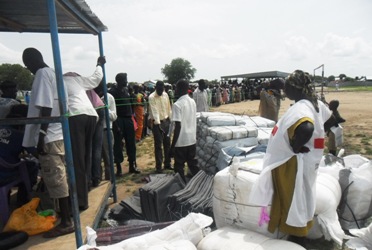NGOs petition Human Rights Council over S. Sudan atrocities
June 12, 2015 (JUBA) – The United Nations Human Rights Council should address serious, widespread and ongoing violations of international human rights and humanitarian law in South Sudan during its 29th session due next week in Geneva, a coalition of leading human rights organisations said in a joint statement.

The various rights organisations also expressed grave concern at the death of thousands of civilians in horrific attacks since the beginning of South Sudan’s civil war in mid-December 2013, often targeted because of their ethnicity or perceived allegiances.
Large parts of key towns, including civilian infrastructure such as clinics, hospitals, and schools, have been looted, destroyed, and abandoned, with over 2 million civilians displaced internally or in neighbouring Sudan, Uganda, Kenya as well as Ethiopia.
Tens of thousands of people have been killed and an estimated three million reportedly at risk of starvation should conflict in the world’s younges nation continue unabated.
The letter, also extended to Sudan Tribune, lso highlights the harassment of independent civil society actors and journalists and the introduction of restrictive legislation imperilling the rights to freedom of association, expression and assembly and severely undermining ongoing efforts to effectively monitor and report on e human rights crisis in the country. Human rights defenders and activists, including those seeking to cooperate with the Human Rights Council have been the subject of escalating threats, attacks and violence.
“We are writing to urge your delegation to address serious, widespread and ongoing violations and abuses of international human rights and humanitarian law committed in South Sudan and to also address the lack of any credible accountability for war crimes and possible crimes against humanity in the country during the upcoming 29th session of the UN Human Rights Council,” partly reads the coalition’s petition.
In March, 47 states reportedly signed a joint declaration in which they emphasised the need for the African Union Commission of Inquiry on South Sudan to release their report, and called for the establishment of an appropriate mechanism to address the situation.
On 22 May, the UN High Commissioner for Human Rights Zeid Ra’ad Al Hussein said the escalation of fighting between government and opposition forces in South Sudan had resulted in alarming gross violations of international human rights and international humanitarian law and has taken a terrible toll on civilians.
He further stated then that “the fight against impunity must be a priority if any peace in South Sudan is to hold.”
Meanwhile, at a public briefing on 26 May 2015, the High Commissioner launched a clear call to members of the UN Human Rights Council to “give high priority to the situation in South Sudan, especially on the question of accountability for past and present violations.” Consequently on 28 May 2015, the UN Security Council adopted a resolution stressing the increasingly urgent and imperative need to end impunity in the country.
The coalition reminded the rights body of its earlier condemation of the violations in South Sudan of international humanitarian law, crimes under international law which may amount to war crimes and crimes against humanity, and other srious violations and abuses of international human rights law.
They advocated for the establish a Special Rapporteur on South Sudan with a mandate to monitor and publicly report on violations of international humanitarian law and violations and abuses of international human rights law, make recommendations for achieving effective accountability for past and ongoing crimes, including through the establishment of transitional justice mechanisms; provide technical assistance to any new mechanisms and request the mandate holder to work in close cooperation with other international mechanisms such as the UN Mission in South Sudan (UNMISS), the Intergovernmental Authority of Development (IGAD), and the African Union to promote human rights and accountability;
Furhermore, the group called for the public release of the final report of the African Union Commission of Inquiry on South Sudan (AUCISS), call on South Sudan to commit to accountability, to the ratification of the Rome Statute and an Article 12(3) declaration accepting ICC jurisdiction from the start of the conflict in December 2013, as well as for the United Nations, African Union, and South Sudan to take steps to ensure fair, credible trials through the establishment of an independent hybrid judicial mechanism.
Since the beginning of South Sudan’s civil war in mid-December 2013, thousands of civilians have been killed in horrific attacks, often targeted because of their ethnicity or perceived allegiances. Large parts of key towns, including civilian infrastructure such as clinics, hospitals, and schools, have been looted, destroyed, and abandoned.
According to the UN humanitarian agency (OCHA), there were over two million civilians displaced internally or in neighbouring countries as of 15 May. Since the beginning of May 2015, renewed armed hostilities in Unity State have reportedly affected hundreds of thousands of civilians.
The United Nations Mission in South Sudan (UNMISS) reportedly released a short statement on May 113 saying they had received reports of villages being burned, rape, and abduction of children. The report echoes concerns of aid workers, many of whom have already been evacuated, leaving hundreds of thousands of civilians without access to lifesaving assistance. There are also reports that both sides have continued the use of child soldiers on the frontlines of the conflict.
In addition, South Sudan’s military and National Security Service have allegedly detained unlawfully dozens of civilians without any access to a lawyer or judge, sometimes for many months. Detainees, often accused of supporting South Sudanese rebels, have been kept in poor conditions, and in some instances tortured or brutally beaten.
The coalition members also expressed concerns over the harassment of independent civil society actors and journalists and the introduction of restrictive legislation imperilling the rights to freedom of association, expression and assembly severely undermine on-going efforts to effectively monitor and report on the human rights crisis.
(ST).
